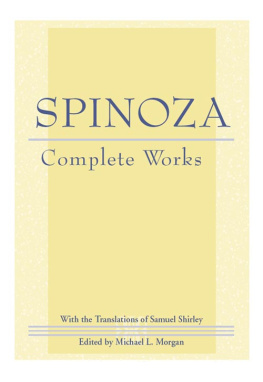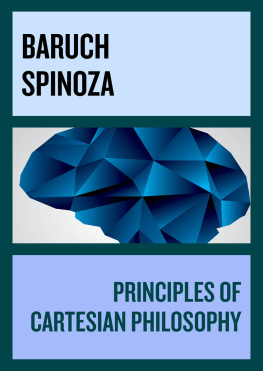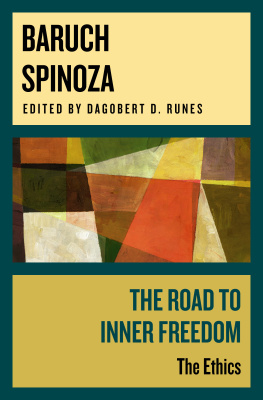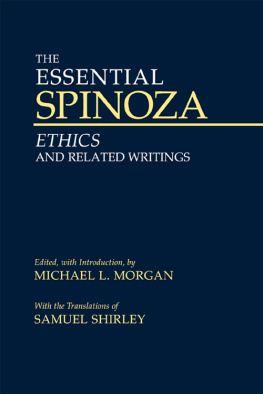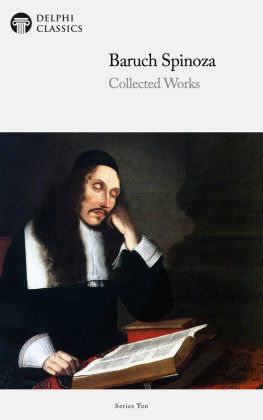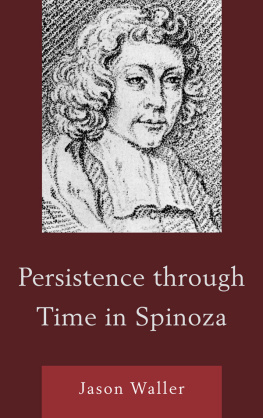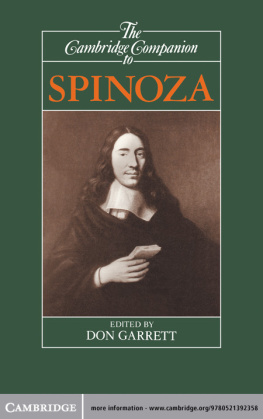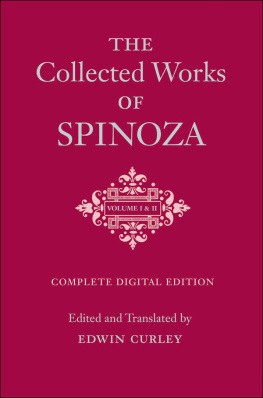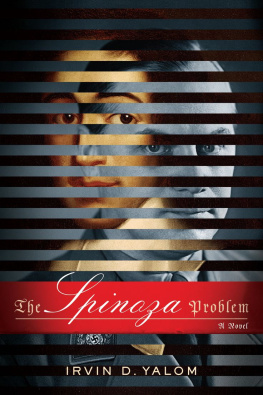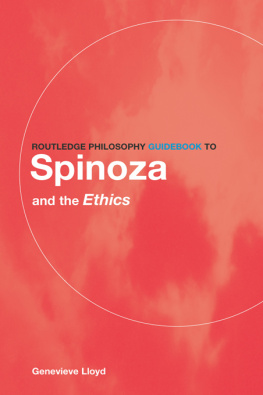Spinoza Baruch - Spinoza
Here you can read online Spinoza Baruch - Spinoza full text of the book (entire story) in english for free. Download pdf and epub, get meaning, cover and reviews about this ebook. year: 2002, publisher: Hackett Publishing Company, Inc., genre: Religion. Description of the work, (preface) as well as reviews are available. Best literature library LitArk.com created for fans of good reading and offers a wide selection of genres:
Romance novel
Science fiction
Adventure
Detective
Science
History
Home and family
Prose
Art
Politics
Computer
Non-fiction
Religion
Business
Children
Humor
Choose a favorite category and find really read worthwhile books. Enjoy immersion in the world of imagination, feel the emotions of the characters or learn something new for yourself, make an fascinating discovery.
- Book:Spinoza
- Author:
- Publisher:Hackett Publishing Company, Inc.
- Genre:
- Year:2002
- Rating:5 / 5
- Favourites:Add to favourites
- Your mark:
- 100
- 1
- 2
- 3
- 4
- 5
Spinoza: summary, description and annotation
We offer to read an annotation, description, summary or preface (depends on what the author of the book "Spinoza" wrote himself). If you haven't found the necessary information about the book — write in the comments, we will try to find it.
Spinoza — read online for free the complete book (whole text) full work
Below is the text of the book, divided by pages. System saving the place of the last page read, allows you to conveniently read the book "Spinoza" online for free, without having to search again every time where you left off. Put a bookmark, and you can go to the page where you finished reading at any time.
Font size:
Interval:
Bookmark:

With
Samuel Shirley
Introduction and Notes, by
Michael L. Morgan
Indianapolis / Cambridge
Baruch Spinoza: 16321677
Copyright 2002 by Hackett Publishing Company, Inc.
All rights reserved
Printed in the United States of America
12 11 10 09 08 3 4 5 6 7
For further information, please address:
Hackett Publishing Company, Inc.
P.O. Box 44937
Indianapolis, IN 46244-0937
www.hackettpublishing.com
Text design by Abigail Coyle and Meera Dash
Library of Congress Cataloging-in-Publication Data
Spinoza, Benedictus de, 16321677.
[Works. English. 2002]
Complete works/Spinoza; translated by Samuel Shirley and others; edited, with introduction and notes, by Michael L. Morgan.
p. cm.
Includes bibliographical references and index.
ISBN 0-87220-620-3 (cloth)
1. Philosophy. I. Shirley, Samuel, 1912 II. Morgan, Michael L., 1944
III. Title.
B3958 .S5 2002
199.492dc21 2002068497
ISBN-13: 978-0-87220-620-5 (cloth)
ePub ISBN: 978-1-62466-230-0
Roger Ariew and Eric Watkins, eds., Modern Philosophy (Second Edition).
Baruch Spinoza, The Essential Spinoza. Edited by Michael L. Morgan, with the Translations of Samuel Shirley.
Baruch Spinoza, Ethics, with The Treatise on the Emendation of the Intellect and Selected Letters. Translated by Samuel Shirley. Edited by Seymour Feldman.
In these translations, I have adhered to the Gebhardt Heidelberg text of 1926 except as noted. Leaving the task of annotation and exposition in the hands of more competent scholars, I shall confine myself in this Preface to a personal odyssey, a sort of voyage around Spinoza.
At Oxford I do not remember that I read anything by Spinoza and very little about him. But that little interested me strangely. So I attended the lectures given by H. H. Joachim, without much understanding. These lectures were delivered in the late afternoon, and as the sun streamed through New College windows onto the gray head of that venerable and beloved figure, it was for me an aesthetic experience rather than an intellectual enlightenment.
But the seed was sown. Many years later, being entrusted with the task of lecturing to university extension adult classes, I chose Spinozas Ethics, using the edition translated by Boyle. That edition was prefaced by an inspiring introduction by Santayana. But there were a number of passages in the translation that puzzled me, and when I sought out the original Latin in a library, I found that they were mistranslations. Writing to the publisher, I pointed out four such passages and provided my own translations. In due course I received a courteous reply, confirming my criticisms and promising to incorporate my corrections in the next reprint. A check for 5 was enclosed (it should be remembered that 5 was worth far more in the 1950s than it is now). The next edition appeared with my corrections.
Now I had tastedjust a sipof the heady wine of authorship. Ambition grew; could I not improve on the Boyle translation? My offer to do so was courteously refused by the publisher as commercially unviable.
In 1972, at the age of 60, I resigned my post as headmaster of a grammar school. Gifted with the abundant leisure of retirement, I turned my mind to a translation of Spinozas Ethics. This I duly offered to some respected publishers in the United Kingdom. They declined, invariably with courteous regrets, but one of them, fortunately, advised me to try Hackett Publishing Company in the United States.
So began my long and happy connection with Hackett. My translation of the Ethics came out in 1982. Encouraged by a few laudatory reviews, I turned my attention to the Theological-Political Treatise, a work for which I have a fervent admiration. Thereafter, gently cajoled by Lee Rice, to whom I remain vastly indebted, I continued with the rest of Spinozas works with the exception of the Hebrew Grammar and the Short Treatise on God, Man, and His Well-Being, which was originally written in Dutch. The results are here before you.
A word on Spinozas Latinity. This was criticized by some earlier scholars, perhaps because of his modest admission in Letter 13, where he seeks the help of his more accomplished friends in polishing his hastily composed Principles of Cartesian Philosophy. Unsure of himself as he may have been, he nevertheless succeeded in forging for himself a powerful linguistic instrument, wonderfully lucid, devoid of all rhetoric, and with a peculiar charm of its own. It was an appropriate medium of expression for one who, in much of the Ethics, was nearing the limits of what it is that can be put into words.
I could not have persisted with the task of translation without a steady conviction of its worthwhileness. To my mind, although Spinoza lived and thought long before Darwin, Freud, Einstein, and the startling implications of quantum theory, he had a vision of truth beyond what is normally granted to human beings. He was relentless in pursuit of a goal that was basically ethical and religious, ridding himself of the anthropocentric bias that is inevitably innate in human beings and manifested in their religious beliefs. His conclusions did not dismay him, as they did so many of his contemporaries when they realized the full implications. Even Henry Oldenburg, his correspondent for many years, in his later letters was appalled when he came to see the full implications of Spinozas radical thinking. But Spinoza boldly looked reality in the face and, far from being discouraged at what he saw, drew from it a spiritual sustenance, an elevation of mind that supported him all his life. It is this aspect of Spinozism that is captured in the title of Errol Harris book Salvation from Despair. Such, then, are the considerations, purely personal, that have induced me to undertake this lengthy task.
Finally, while I have never contributed to the rich field of Spinozan exegesis, I venture to share with readers an idea that continues to occur to me, one that may be capable of elaboration by other scholars. Genuine artistic creativity seems to us a mysterious business. Many writers, poets, painters, and composers have tried to indicate, with varying success, what happens in this process. They say that they do not know what they are doing or are about to do. They are, as it were, possessed. My own favorite illustration is Book IV of the Aeneid, where Vergil becomes so absorbed in the creation of his Dido character that the stammering Aeneas cuts a very unheroic figure; yet he should be the flawless hero, the prototype of his alleged descendant Augustus. Can the essence of God be seen as the source of the ill-understood phenomenon that we call artistic creativity? In the conatus of human beings, a conatus that derives from Gods potentia, do we see a shadow, an image, of Gods creativity, finding expression most markedly in the process of artistic creativity?
I conclude with a tribute to my wife, who heroically endured for many years my preoccupation with Spinoza.
Samuel Shirley
Reading the works of Spinoza, one can be overwhelmed by a sense of abstract rigor and detachment. They may seem to some readers the product of an almost mechanical mental life. This appearance notwithstanding, I am inclined to ascribe to Spinoza a romantic set of virtues. He is among thinkers extraordinarily creative and novel; his thinking is marked by a marvelous intensity and focus; and yet his deepest commitments are to the most embracing unity and sense of comprehensiveness that one can find in the tradition of Western philosophy. In short, Spinozas writings and his thought are marked by a kind of heroism that is rare and beautifuleven breathtaking.
Font size:
Interval:
Bookmark:
Similar books «Spinoza»
Look at similar books to Spinoza. We have selected literature similar in name and meaning in the hope of providing readers with more options to find new, interesting, not yet read works.
Discussion, reviews of the book Spinoza and just readers' own opinions. Leave your comments, write what you think about the work, its meaning or the main characters. Specify what exactly you liked and what you didn't like, and why you think so.

